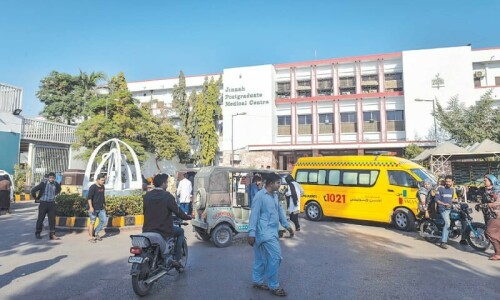KARACHI: Pakistan, a country that yearly reports about 148,000 new cancer cases, can greatly benefit from new research into the molecular structure and genetic make-up of tumours, which is enabling experts to have targeted cancer treatment.
This point was highlighted at a multidisciplinary conference on surgical oncology currently in progress at the Aga Khan University (AKU). The two-day event being attended by experts from 14 countries has been organised in collaboration with the European Society of Surgical Oncology, the American Society of Clinical Oncology and the International Journal of Surgery.
Discussing the impact of new research on cancer treatment, experts stated that molecular analysis of brain tissue was revealing the distinctive ‘signature’ of tumours that were otherwise of a similar type and stage.
“Insights from molecular biology are helping oncologists select the most suitable course of cancer treatment and more accurately predict the response to targeted therapy,” Dr Shahzad Shamim, an associate professor at AKU’s department of surgery, said, adding that this development would ensure optimal treatment for each tumour and a longer, better quality of life for each patient.
Innovations in reconstructive surgery were also discussed during the conference and speakers said that those new trends were helping to restore the function of organs affected by cancer.
Techniques such as intra-operative monitoring, it was pointed out, enabled surgeons to stimulate parts of the spine to quickly and painlessly detect areas that could be reconstructed. This meant that the damaged areas of the spine, which were previously deemed too dangerous to operate on, could now be rebuilt, they said.
Similar technological advances in orthopaedic surgery, they stated, would mean that high quality implants could be used to replace bones and joints damaged by cancer, thereby helping preserve essential body functions.
Robot-assisted surgery was another prominent theme which was taken up at the conference and it was said that while use of robots in the operating theatre could enhance the precision of surgeries, the process of learning how to work with technology was typically very demanding in terms of time and difficulty.
“Bringing together experts from around the world will boost our chances of detecting the disease in early stages and deliver more effective treatment for cancer patients,” Dr Masood Umer, an associate professor at AKU’s department of surgery and chair of the conference, said, adding that about 148,000 new cases of cancer were reported in Pakistan every year.
The AKU, he said, was currently working with Sick Kids Hospital in Toronto, Canada, to explore how molecular insights could enhance the treatment of complicated cases of brain cancer.
This partnership between Pakistani and Canadian researchers was leading to transfer of knowledge and skills, he noted.
Published in Dawn, February 3rd, 2018











































Dear visitor, the comments section is undergoing an overhaul and will return soon.